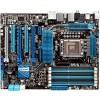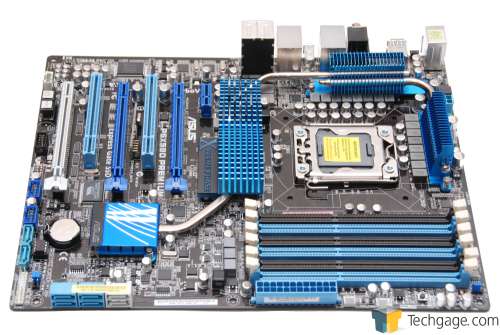- Qualcomm Launches Snapdragon 4 Gen 2 Mobile Platform
- AMD Launches Ryzen PRO 7000 Series Mobile & Desktop Platform
- Intel Launches Sleek Single-Slot Arc Pro A60 Workstation Graphics Card
- NVIDIA Announces Latest Ada Lovelace Additions: GeForce RTX 4060 Ti & RTX 4060
- Maxon Redshift With AMD Radeon GPU Rendering Support Now Available
ASUS P6X58D Premium

Intel may have launched its X58 chipset nearly a year-and-a-half ago, but board vendors continue to come out with new product as technologies improve. This past winter, ASUS released the P6X58D Premium, a high-end offering that boasts support for both SATA 3.0 and USB 3.0, and one that just begs to be pushed hard with overclocking.
Page 9 – Power Consumption, Final Thoughts
It goes without saying that power efficiency is at the forefront of many consumers’ minds today, and for good reason. Whether you are trying to save money or the environment – or both – it’s good to know just how much effort certain vendors are putting into their products to help them excel in this area. ASUS and Gigabyte are two that immediately come to mind that have put a lot of R&D into this, and I’m sure with their leadership, power consumption will consistently get better.
To help see what kind of wattage a given motherboard eats on average, we use a Kill-A-Watt that’s plugged into a power bar that’s in turn plugged into one of the wall sockets, with the test system plugged directly into that. The monitor and other components are plugged into the other socket and is not connected to the Kill-A-Watt. For our system specifications, please refer to our methodology page.
To test, the computer is first boot up and left to sit at idle for five minutes, at which point the current wattage is recorded if stable. To test for full CPU load, eight instances of SP2004 are run using the Small FFT test, one for each thread. For our last test, four of those instances are closed while an “Extreme” run of 3DMark Vantage is performed, which would mimic usage of a game that makes heavy use of the CPU.

For the most part, no X58 motherboard dominates the rest where power consumption is concerned, except perhaps Intel’s DX58SO. Sadly, that’s due to the lack of features rather than impressive power efficiency. Overall, the P6X58D sides pretty much alongside the P6T Deluxe (a fairly similar board in terms of goals and features).
Final Thoughts
As impressive as any $300 motherboard might be, it’s always difficult as a reviewer to outright recommend one based on the cost alone. After all, there are many X58 offerings out there that cost much less, and still include USB and SATA 3.0. So what exactly does the P6X58D Premium offer over all the rest?
It’s certainly not just one thing, but many small things that when combined deliver a very refined end product. ASUS has numerous technologies that it packs into its higher-end boards, both hardware and software-based, and most of them are actually very useful, and not just there for marketing reasons.
MemOK! is an example of this. That’s a feature that allows you to push a button on the motherboard that will put memory settings to a failsafe mode in order for the PC to boot up. So if you have a kit that for some reason doesn’t agree with your board, it should boot up with MemOK! (unfortunately I haven’t had the opportunity to use this feature as all of our memory kits agree with the board just fine).
A lot of what goes into the premium gets pushed towards the overclocking aspect. While maybe not the first board hardcore overclockers would rush to, the P6X58D Premium is very capable of achieving huge overclocks. Our particular sample managed to push our Core i7-980X to 4.14GHz with modest voltage (8 hours LinX stable). Again, this is an area where there are many reasons for the effectiveness of overclocking, from the phase layout and underlying design to the very robust and sometimes exhaustive BIOS.
In addition to all this, the board includes more than enough peripheral connectivity, a nearly-perfect board layout and screams “complete”, despite the lack of interesting add-ons that ASUS has become known for. If you’re looking to dive deep into X58 and want one of the best boards out there, the P6X58D Premium is well worth a look. If you’re not quite gung-ho on spending $300 on a motherboard, there are alternatives out there to choose from, even from ASUS itself.
Discuss this article in our forums!
Have a comment you wish to make on this article? Recommendations? Criticism? Feel free to head over to our related thread and put your words to our virtual paper! There is no requirement to register in order to respond to these threads, but it sure doesn’t hurt!
Support our efforts! With ad revenue at an all-time low for written websites, we're relying more than ever on reader support to help us continue putting so much effort into this type of content. You can support us by becoming a Patron, or by using our Amazon shopping affiliate links listed through our articles. Thanks for your support!






